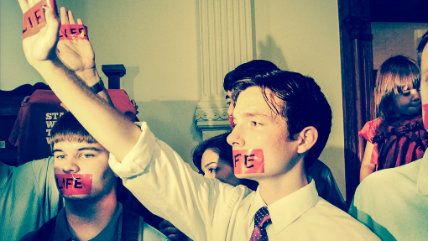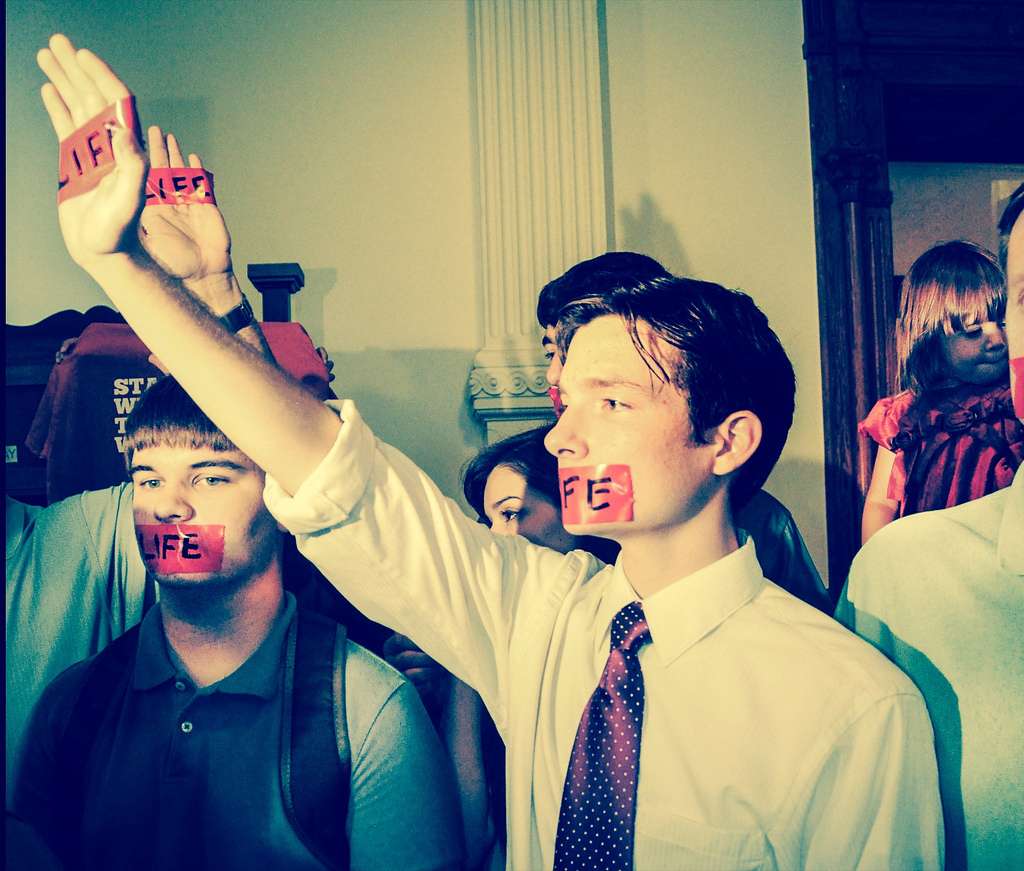Abortion Access Across Country Could Be Affected by Upcoming SCOTUS Ruling
SCOTUS decision on Texas abortion law could reverberate far beyond Lone Star state


Last week, the U.S. Supreme Court agreed to hear a case brought by the nonprofit Center for Reproductive Rights on behalf of Texas abortion clinics. The group is challenging a 2013 Texas law imposing strict new regulations on abortion clinics and doctors in the Lone Star state. Expected to hear arguments in spring 2016, the court's ultimate decision could reverberate far beyond Texas.
For one thing, the SCOTUS decision will come in the "final trimester of the presidential campaign," as The Economist notes. There will be no way for the candidates to avoid talking abortion. And judicial appointments will also be forced onto people's minds.
The Supreme Court ruling will also pave the way for a number of similar regulations in other states to find resolution. As it stands, regulations similar to those contested in Texas are in the midst of legal challenges in Alabama, Kansas, Louisiana, Mississippi, and Wisconsin. Should the Supreme Court find the Texas regulations constitutional, contested rules in these states can go forward, and legislatures in other states will be empowered to pass similar mandates.
So far, such measures—referred to by opponents as targeted regulation of abortion providers (TRAP) laws—have been remarkably successful at shutting abortion clinics down.
As Damon Root explained here last week, the Texas case (Whole Woman's Health v. Cole) centers on two specific provisions of Texas House Bill 2 (the legislation that inspired an 11-hour Senate protest from former Democratic Sen. Wendy Davis). The first provision requires all abortion clinics to meet the same standards as hospital-style surgical centers, even if the clinics do not perform surgical abortions. The second stipulates that abortion doctors must have admitting privileges at a hospital within 30 miles. Texas says the regulations are legitimate attempts to protect patient health and safety, while clinics argue that the rules are just pretexts to force them into shutting down.
In an unsigned October 2014 order, SCOTUS temporarily blocked both Texas provisions from taking effect. "Justices Samuel Alito, Antonin Scalia and Clarence Thomas said they would have ruled against the clinics in all respects," AP reported at the time.
The Fifth Circuit Court of Appeals upheld the Texas regulations this past June, stating that "medical uncertainty underlying a statute is for resolution by legislatures, not the courts," and that a projected 75 percent reduction in the number of Texas abortion clinics should the law take effect does not pose an "undue burden" on women's access to abortion. The Center for Reproductive Rights asked SCOTUS to take the case, which the Court agreed to last Friday.
"When the justices consider Whole Women's Health, they will first ask whether the Court is the proper tribunal for a fine-grained factual analysis of the impact of HB 2 on Texans," explains The Economist. "If they see it as their role to dive into the weeds, the challenge becomes conceptual. Where is the line between making abortions a little more difficult or expensive to obtain' (perfectly constitutional) and imposing a 'substantial obstacle' (patently unconstitutional) on women who want them?"
Editor's Note: As of February 29, 2024, commenting privileges on reason.com posts are limited to Reason Plus subscribers. Past commenters are grandfathered in for a temporary period. Subscribe here to preserve your ability to comment. Your Reason Plus subscription also gives you an ad-free version of reason.com, along with full access to the digital edition and archives of Reason magazine. We request that comments be civil and on-topic. We do not moderate or assume any responsibility for comments, which are owned by the readers who post them. Comments do not represent the views of reason.com or Reason Foundation. We reserve the right to delete any comment and ban commenters for any reason at any time. Comments may only be edited within 5 minutes of posting. Report abuses.
Please to post comments


Those guys in the photo really didn't think the placement of their life sign through. Don't ever give your opponents the opportunity to draw parallels to the Nazis.
"Don't leave me hanging, bro."
Romulans?
So abortion is the only medical service that can be unconstitutionally burdened by regulation, the only one that a person has a fundamental right to? What are the regulations on similiarly situated outpatient clinics? It will be interesting to see how the Left squares regulation is bad for abortion but vital for everything else, though cognitive dissonance is their thing.
I've never been able to pin an abortion advocate with this dissonance down and ask them how they justify it. The only big supporter I know believes that you aren't a real person until about two and is fully open that she believes the government is there to save and appease the lower classes.
You two display the same dissonance, opposed to regulation generally but all for it when it is putting abortion clinics out of business.
Texas is not doing anything different than San Francisco did when it regulated its last gun shop out of business.
Did they express their position or just point out the left's dissonance?
I'm going off what they have both expressed previously.
I've never expressed support for abortion clinic regulations on this site.
"on this site" is an interesting qualification.
I spend time on Slate advocating that liberals take their ideologies to logical conclusions. Principle inconsistencies are a personal pet peeve.
"I spend time on Slate advocating that liberals take their ideologies to logical conclusions."
*coffee through nose*
You should change your handle. Perhaps to ' The Ingenious gentleman of La Mancha'?
A major reason for supporting legal abortion is so that it is properly regulated. There is no inconsistency. There is a spectrum from not regulated to regulated to abolished. Everyone knows the motives of the "regulators" of the anti-abortion crowd.
Then you have a good point. I was unaware.
I would happy if outpatient clinics were regulated to the same extent abortion clinics are and satisified if abortion clinics are regulated to the same extent outpatient clinics are. I find that abortion being some special case to be patently ridiculous.
That it just happens to put abortion clinics out of business is just a coincidence, right?
Like the only regulations that you actually bitch about are for clinics where humans are killed as standard operating procedure while the ones that are for saving lives and health you are apparently "meh" about and do not care if they are run out of business.
Well, no, all such regulation is unconstitutional, but people only convinced SCOTUS to rule about one particular area of medicine, not to tell the AMA, FDA and the whole rest of the medico-industrial complex to get fucked.
Initially I thought the Texas law was not onerous and seemed like good sense. Some here argued very convincingly against that so now I am wobbling on the fence. I suppose if complications arise an ambulance can be called and the patient admitted to the nearest hospital regardless if the physician has admitting privileges. Perhaps the clinic can just verify that the patient can be admitted? Some proximity requirements to hospitals? I don't know enough about this.
As for the real issue at hand here, abortion, I don't think the partisans on either side would be comfortable with my arguments though many here are.
The Texas law is probably a somewhat higher regulation standard than the medical industry normally sees. It's similar to Obama's regulations regarding the Coal industry. However, it's also clear that Abortion clinics have in many cases had a "protected" status that held them to a lower regulatory standard than other medical offices.
This is just another round in the Cultural Wars.
then I stick with my position on abortion and will stay out of this particular battle.
Oh, come on! It is not like they're simply removing moles with lasers, Elizabeth.
On Texans? Wow, I didn't know The Economist is into melodrama. I can tell you who is NOT being impacted by this resolution: Texan men and Texan women who don't want to murder their children. And I can tell you, that is a great number of Texans.
"Anarchy for me, the jackboot of government for lady parts."
It is not murder to withdraw life support, when that life support is connected to you.
If only this Weigelian scumbagetta's mom had gotten an abortion. I would have even been willing to shell out a little more tax money out of pocket for that.
"Texas says the regulations are legitimate attempts to protect patient health and safety, while clinics argue that the rules are just pretexts to force them into shutting down."
Why can't prolifers have *both* motives?
*They're* not the ones whose policies preclude them from supporting both mother and child. It's the choicers who have that problem, because what they do in the name of supporting the mother - letting her have "abortion access" - is intrinsically contrary to the interests of her unborn child.
So the choicers project their problem onto the lifers. "*We* have to choose between the mother and the child, so we're certain that our opponents must choose, too!"
The thing is that the prolifers want to protect both mother *and* child - the choicers think this is inconsistent because how can you protect the mother without letting her kill the child? Does not compute!
Therefore, the prolifers have to decide if they want to protect women from incompetent abortionists, improper facilities, hallways too narrow for hospital gurneys to fit (and prolifer demonstrators repeatedly document ambulances coming to these clinics to carry women to the hospital).
The common element here is that none of these things does any damage to the unborn child - indeed they help the child my making abortion more difficult.
So it's a win/win for prolifers, a point which the choicers seem to have trouble grasping.
Like that is going to yield a conceptual definition of "substantial burden".
As I recall, Texas' regulations mirror those of most European nations. You'd think that'd make most liberals happy.
How many Kermit Gosnell's are out there?
There can't be that many, "Kermit" is a pretty uncommon name.
In the same way that discriminatory government licensing was found to be morally abominable and unconstitutional only when it affects gay couples, discriminatory medical regulation will be found equally morally abominable and unconstitutional only when it affects women seeking an abortion. Libertarian moment, bitches!
See Curtis J. Neeley Jr., Petitioner v. Louis Jerry Edwards, et. al., (15-7059)
in HTML to explain what SCOTUS will soon do. http://human-dignity-us.org
It also explains WHY the other two momentous cases just had to be done.
gay marriage and the ACA.
See the Texas case discussed on page 14.
See Curtis J. Neeley Jr., Petitioner v. Louis Jerry Edwards, et. al., (15-7059)
in HTML to explain what SCOTUS will soon do. http://human-dignity-us.org/#14